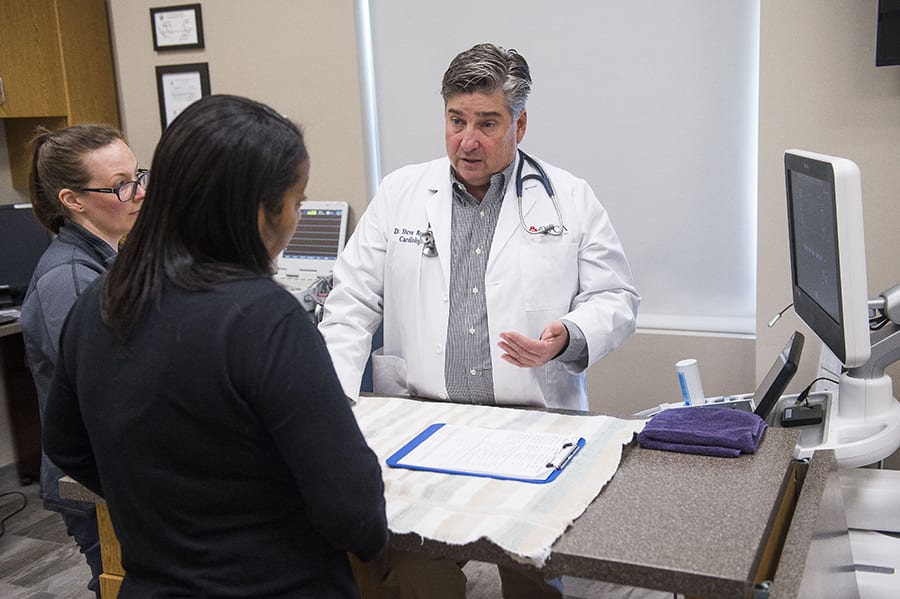Discovering the Vital Solutions Provided by a Vet Cardiologist: Understanding Ultrasound and CT Scan Strategies
Vet cardiologists play a crucial role in the health of pet dogs by identifying and dealing with different heart problems. They use advanced imaging methods, such as cardiac ultrasound and CT scans, to offer accurate evaluations. Each technique has its distinctive benefits and applications. Comprehending these strategies is important for family pet owners seeking the best look after their companions. What elements should animal owners consider when selecting in between these analysis devices?

The Function of Veterinary Cardiologists in Pet Dog Health Care
Veterinary cardiologists play a crucial duty in the medical care of animals, focusing particularly on diagnosing and dealing with heart-related conditions. They have specialized training that permits them to translate complicated diagnostic tests and recognize numerous cardiovascular problems. These experts make use of innovative methods, such as echocardiography and electrocardiography, to assess heart function and framework accurately.Veterinary cardiologists additionally develop tailored therapy plans that might include medicines, way of living adjustments, and, sometimes, surgical interventions. Their proficiency encompasses educating family pet owners concerning heart wellness, emphasizing the importance of normal check-ups and very early detection of potential troubles. Cooperation with general veterinarians is important, as it guarantees complete look after pet dogs with presumed cardiac problems. By providing specialized solutions, vet cardiologists considerably boost the high quality of life for family pets and offer comfort for their proprietors, strengthening the significance of heart health and wellness in general animal wellness.
Typical Cardiac Concerns in Animals
Typical cardiac problems in pets can substantially affect their health and top quality of life. Heart murmurs, various kinds of cardiomyopathy, and congenital heart defects are amongst the most widespread conditions that veterinarians come across. CT Scans For Animals. Recognizing these issues is crucial for pet dog proprietors to ensure prompt medical diagnosis and suitable treatment
Heart Murmurs in Pets
Heart murmurs can be a resource of concern for pet dog proprietors, they are not constantly a sign of significant wellness concerns. A heart murmur is an irregular noise generated by rough blood circulation within the heart. In family pets, these murmurs can be triggered by numerous elements, consisting of congenital heart flaws, shutoff issues, or even stress and anxiety throughout examinations. Numerous family pets with heart murmurs lead normal lives without substantial wellness impacts. To establish the underlying cause, veterinary cardiologists often utilize analysis strategies such as echocardiograms and Doppler ultrasounds. Early detection and evaluation are important, as they may assist manage any prospective heart concerns effectively. Animal proprietors are motivated to consult their vet for a detailed evaluation if a heart whispering is identified.
Cardiomyopathy Types Explained
Cardiomyopathy incorporates a team of conditions affecting the heart muscular tissue, resulting in compromised cardiac function in pets. One of the most typical kinds consist of dilated cardiomyopathy (DCM), hypertrophic cardiomyopathy (HCM), and limiting cardiomyopathy (RCM) DCM mostly affects dogs, creating the heart to deteriorate and enlarge, which diminishes its capacity to pump blood successfully. In contrast, HCM is more common in felines, identified by the enlarging of the heart wall surfaces, often causing obstructed blood flow. RCM, though much less usual, occurs when the heart muscle comes to be stiff, restricting its capability to fill up with blood. Each kind presents distinct obstacles in diagnosis and treatment, necessitating specialized vet cardiological analysis to assure peak monitoring and take care of influenced family pets.
Genetic Heart Problems
Hereditary heart problems stand for a substantial classification of heart issues in family pets, unique from obtained problems such as cardiomyopathy - CT Scans For Dogs. These flaws are structural irregularities present at birth, impacting the heart's typical function. Common types consist of license ductus arteriosus, ventricular septal flaws, and pulmonic constriction. Signs might vary commonly, varying from light to severe, and can include workout intolerance, coughing, and difficulty breathing. Early medical diagnosis with innovative imaging techniques like ultrasound is important for reliable monitoring. Vet cardiologists play a crucial duty in recognizing these conditions and recommending proper therapy alternatives, which may include clinical administration or surgical intervention. Recognizing congenital heart defects permits far better outcomes and boosted lifestyle for impacted animals
Recognizing Heart Ultrasound: Just How It Functions
A considerable variety of veterinary methods currently use cardiac ultrasound as an important diagnostic tool for assessing heart health in animals. This non-invasive technique utilizes high-frequency sound waves to produce pictures of the heart's structure and function. During the procedure, a veterinary service technician uses a gel to the pet's upper body and uses a transducer to discharge ultrasound waves. These waves jump off the heart and bordering frameworks, creating real-time pictures on a monitor.Veterinarians can evaluate various aspects of cardiac health and wellness, consisting of chamber dimension, wall motion, and shutoff feature. In addition, cardiac ultrasound enables the detection of irregularities such as liquid build-up and congenital heart problems. This technique is vital for detecting problems that may not be visible through basic radiographs. By offering thorough details about the heart's anatomy and efficiency, cardiac ultrasound help in creating reliable treatment prepare for animals struggling with heart disease.
The Significance of CT Checks in Detecting Heart Issues
How do CT scans boost the medical diagnosis of heart disease in veterinary medication? CT scans supply comprehensive cross-sectional pictures of the heart and surrounding frameworks, permitting vets to picture complex physiological connections. This imaging technique is particularly useful in recognizing genetic heart issues, heart tumors, and irregularities in blood vessels. By using advanced imaging formulas, CT scans can assess heart chamber sizes and function, supplying a thorough view that may be hard to company website accomplish with conventional methods.Additionally, CT angiography can visualize blood flow and determine areas of constriction or blockage, which is necessary for intending potential treatments. The rate and accuracy of CT scans also assist in fast diagnoses, crucial in emergency situation circumstances. Inevitably, the incorporation of CT scans right into vet cardiology significantly boosts the precision of diagnoses, making it possible for targeted therapy strategies and boosting individual results for pets struggling with heart disease.
Comparing Ultrasound and CT Check Methods
While both ultrasound and CT scans are important tools in vet cardiology, they supply unique benefits and constraints that affect their usage in detecting heart conditions. Ultrasound, or echocardiography, gives real-time imaging of the heart's framework and function, enabling vets to evaluate heart chambers, shutoffs, and blood circulation. It is specifically reliable for evaluating conditions like coronary infarction and cardiomyopathy. Ultrasound might be limited in visualizing particular anatomical frameworks due to individual size or obesity.In comparison, CT checks offer comprehensive cross-sectional pictures of the heart and surrounding tissues, making them ideal for identifying architectural irregularities, lumps, or vascular problems. Although CT scans supply complete understandings, they require sedation and may involve radiation exposure. Inevitably, the choice in between ultrasound and CT scans relies on the certain professional situation, the client's condition, and the details needed for an accurate diagnosis.
Therapy Options Readily Available With Veterinary Cardiology
Veterinary cardiology provides a variety of treatment alternatives tailored to address numerous heart conditions in pets. Treatment strategies commonly start with way of living modifications, including diet plan modifications and workout changes, focused on boosting overall heart health and wellness. Drugs play an important function, with cardiologists prescribing medicines such as diuretics, beta-blockers, and ACE inhibitors to take care of symptoms and improve cardiac function.In a lot more severe instances, interventional procedures, such as balloon valvuloplasty or stent placement, may be essential to relieve blockages or enhance blood flow. For sure hereditary heart issues, surgical alternatives may be discovered to correct structural concerns. In addition, ongoing tracking and follow-up treatment are crucial components of a thorough treatment strategy, enabling timely modifications based on the pet's response to therapy. Overall, veterinary cardiology concentrates on offering effective, individualized like enhance the wellness and well-being of animal patients with heart disease.
Just how to Prepare Your Pet for a Cardiac Analysis
Preparing a family pet for a heart evaluation is important to assure exact results and a smooth process. Proprietors should first set up the appointment with the vet cardiologist and talk about any specific demands or issues. It is advisable to withhold food for at the very least 12 hours prior to the examination, as this assists enhance imaging quality during procedures like ultrasound or CT scans.Additionally, maintaining a tranquil setting on the day of the appointment can help in reducing the pet's anxiety. It is helpful to bring along any type of relevant medical documents, consisting of previous tests and medications (CT Scans For Animals). Owners should likewise make sure that their family pet is comfortable and leashed throughout transportation to the clinic. Familiarizing themselves with the assessment procedure can ease fears and assist in asking notified concerns throughout the appointment. By adhering to these steps, owners can add considerably to the effectiveness of the cardiac analysis
Often Asked Inquiries
How much time Does a Heart Ultrasound or CT Check Take?
The duration of useful site a heart ultrasound usually ranges from 30 to 60 mins, while a CT scan may take roughly 15 to half an hour. Variables such as the client's problem can influence these time quotes.

Are There Any Type Of Threats Related To These Analysis Procedures?

Can I Remain With My Family Pet Throughout the Procedure?
The vet center's plan usually determines whether pet owners can remain throughout procedures. While some facilities encourage proprietor existence for comfort, others might call for separation to guarantee safety and ideal conditions for analysis imaging.
How Much Do These Diagnostic Examinations Usually Expense?
The expenses of analysis examinations, such as ultrasound and CT scans, typically vary based on location and facility. Commonly, rates vary from a couple of hundred to over a thousand dollars, mirroring the intricacy and modern technology entailed.
What Is the Healing Process After a Heart Analysis?
The recuperation procedure after a heart examination includes checking the family pet for any instant responses, guaranteeing convenience, and limiting exercise. Veterinarians generally supply post-evaluation guidelines to direct family pet owners throughout this crucial recuperation period. Heart murmurs, different kinds of cardiomyopathy, and congenital heart problems are among the most common problems that vets come across. A heart murmur is an abnormal noise created by unstable blood circulation within the heart. Cardiomyopathy incorporates a group of conditions affecting the heart muscle, leading to jeopardized cardiac function in pets. Genetic heart flaws stand for a considerable group of heart issues in animals, distinctive find more from acquired conditions such as cardiomyopathy. Ultrasound, or echocardiography, supplies real-time imaging of the heart's framework and feature, allowing veterinarians to analyze heart chambers, shutoffs, and blood circulation.
Comments on “Common Symptoms That Your Pet Might Need a Cancer Veterinary Near Me}”